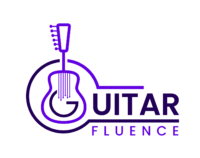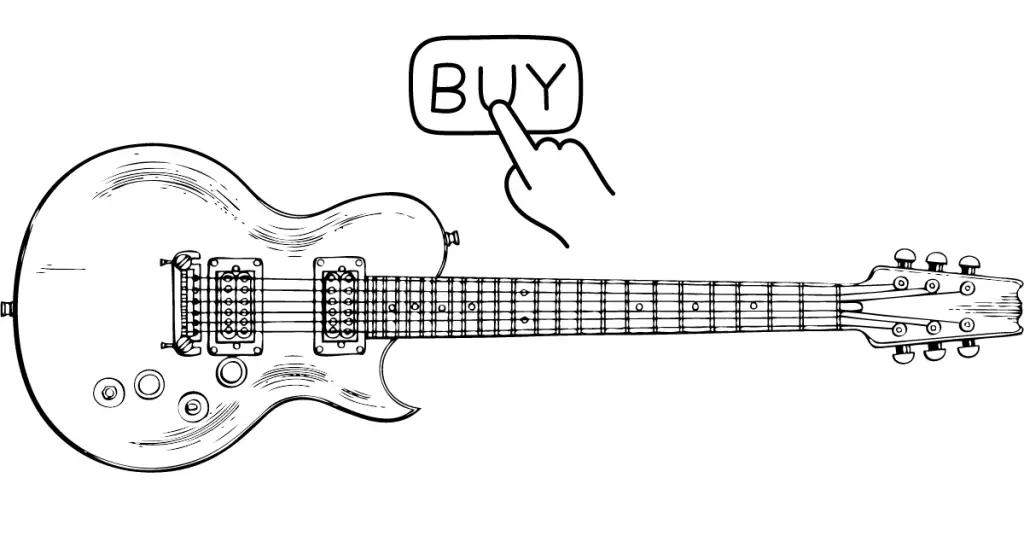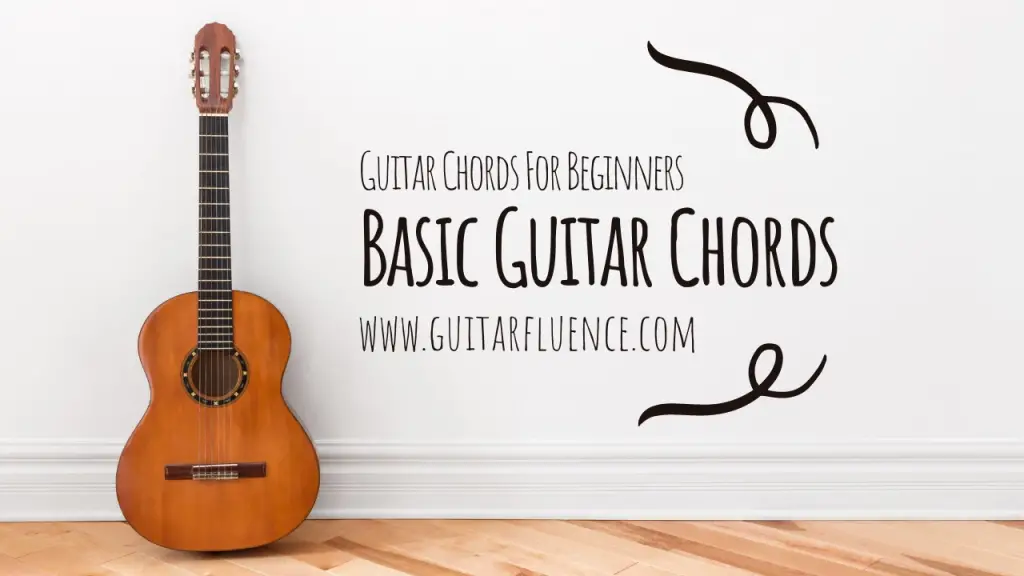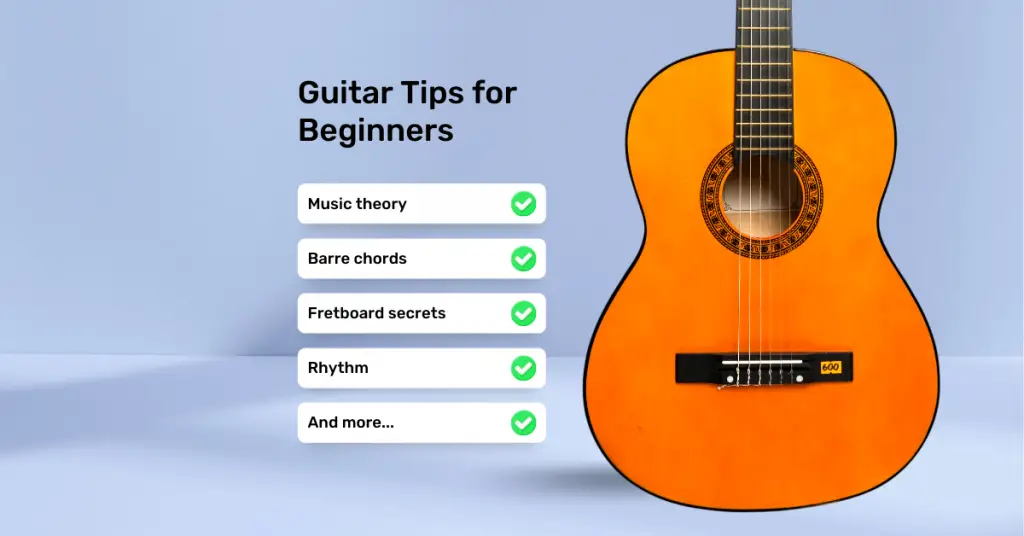Are you thinking about picking up the guitar?
If so, I applaud you! The guitar is an amazing instrument, and you won’t regret learning it!
There is quite a list of things to know before learning the guitar, so read through this list to make sure the guitar is the right fit for you!
Table of Contents
1. Develop A Practice Routine
Guitar does require a small level of commitment. A simple practice routine will do just fine.
As a matter of fact, a simple, high quality practice routine will do more good than a low quality, high quantity practice routine.
This means that you need to practice daily, and needs to be catered to your current guitar goals!
You’ll forget what you’ve learned if you don’t practice daily, which leads to a vicious cycle of learning the same things over and over again!
Overall, you’ll need to develop a regular routine if you don’t want to waste your time.
2. You Need These to Start Learning Guitar
Here are some things you’ll need to start playing guitar.
A guitar
You’re obviously going to need a guitar to start learning!
I suggest borrowing a guitar if you’re unsure about whether or not you will stick with the guitar.
If you do end up buying a guitar, make sure to buy a good quality guitar from a trusted vendor! The easiest way to steer yourself away from a guitar is by buying a guitar that’s difficult to play, hard to maintain, or sounds bad!
Guitar Picks
I strongly urge you to buy guitar picks.
A guitar pick is the key that unlocks your guitar! You’ll use them in almost every style.
Even if you’re starting with fingerstyle guitar, you’ll still need a pick for strumming! You can also use a thumb pick to assist your fingerstyle technique.
Tuner
You’ll need a way to stay in tune, and the easiest way to do that is with a guitar tuner!
You need to be tuning your guitar every time you pick it up. Tuning makes your instrument sound good!
You can use a mobile application for tuning, but a tuner that actually attaches to the guitar will likely be more accurate.
3. Should I start with an acoustic or electric guitar?
As a general rule, guitar players and teachers commonly suggest starting with an acoustic guitar. Acoustic guitars will help your fretting hand get used to pushing down difficult chords and frets, plus an acoustic guitar is easy to take on the go!
However, the choice between starting with an acoustic or electric guitar really boils down to your guitar goals.
The electric guitar will obviously be a better choice for guitarists learning rock, metal, or blues! This is due to the fact that the techniques required to play these types of genres are easier to perform on the electric guitar.
An acoustic guitar is better suited for singer-songwriters playing pop or folk music.
You honestly can’t go wrong with either choice at the end of the day!
4. Learn technique
You’ll want to focus on learning guitar techniques from day one!
This includes picking techniques and lead guitar techniques.
Studying technique starts with learning how to hold a guitar pick properly.
From there you’ll want to see what types of techniques are being used in the music you’re working on. You’ll then seek out relevant technical exercises to help you work on those particular techniques!
You’ll be able to play nearly anything you want on the guitar as long as you can overcome technical barriers.
5. Other guitarists can teach you the most
As a general rule you’ll learn guitar faster by practicing with other guitar players!
These other players can be guitar teachers, local artists, or friends and family that play guitar!
When you practice with experienced guitar players they’ll be able to provide constructive feedback, which will help you develop as a guitarist.
These guitar players can also play harmonies with you, which is oftentimes required in a song.
Aside from learning from these players, you’ll have a ton of fun jamming with them!
6. Listen to music with guitars
Listening to music with guitar is essential for learning the instrument.
How are you supposed to know what a guitar sounds like if you don’t listen to music with guitars?
Since guitar is such a versatile instrument you’ll see that it is played differently across different genres.
These differentiations are due to changes in technique, styles, and tones across genres.
Being able to recognize these differences will make you a more complete guitarist.
7. Learn Open Chords First
Open guitar chords are what a beginner should learn first.
The best open guitar chords for beginners are CAGED chords, which set up the foundation for learning triads and barre chords across the fretboard.
Due to the fact that they are so foundational you’ll end up seeing these chords in nearly everything that you play!
8. Learn how to read notation or tablature
Learning to read notation and/or tablature is equivalent to being literate in your own language.
It’s certainly possible to “speak” with your guitar without knowing tablature or musical notation, but you’ll eventually need to learn tabs or notation if you want to learn songs easily or do any professional work.
My favorite tab method books are the Hal Leonard Guitar Tab Method books!
My favorite notation book for guitar is the regular Hal Leonard Guitar Method book.
9. Posture/Holding a guitar
The first thing you need to learn is how to hold a guitar properly, and how to maintain proper posture.
Not holding a guitar properly can lead to poor technical development, and a poor posture can lead to health issues.
Learning how to hold a guitar is easy, but learning proper posture can be a bit difficult. If you’re having major problems with your posture I ‘d suggest talking to a specialist.
10. Rhythm is king
The day you start playing is the day that you need to start mastering rhythm!
Rhythm gives you the beat, and the beat makes the music sound good. Your melodies and chords are useless without a consistent rhythm.
Learn rhythm by tapping to the beats of songs as you play along to them.
A metronome is another important tool for learning rhythm. A metronome allows you to set the tempo, so you can practice your guitar exercises at different speeds.
Here’s a great free metronome!
11. Have a professional maintain your instrument
Getting a professional setup will do a lot of good things for you.
First of all, it will make your guitar easier to play.
Second, regular maintenance is necessary if you want a “healthy” guitar. A lack of maintenance can lead to a bowed neck, and can create cracking at certain parts of the guitar.
You can maintain your guitar at home by changing the strings regularly, keeping your guitar in a case, and wiping down the fretboard to remove oils and dust.
12. It is hard at first!
Guitar is hard, there’s no way around it. As a matter of fact, 90% of guitarists abandon the instrument within a year.
Don’t be part of that 90%! Guitar needs to stay alive, and you can help it stay that way by committing to it!
Like any other skill, the guitar just requires quality practice time, and patience.
And unlike other skills, you can actually see some incredible results in a short amount of time if you know what to practice!
Learn with an instructor if you find yourself struggling.
If you don’t have access to an instructor you can use YouTube channels to learn, like my own!
Just make sure you’re learning from reputable teachers.
13. Focus on one thing at a time
Don’t spread yourself too thin with your learning!
When you’re getting started with guitar you’ll want to focus on things that will get you playing what you want the fastest!
For example, if you want to play blues guitar you’ll need to focus on learning the blues scale, learning blues licks, practicing slides and bends, and listening to blues music.
That’s just one example! Figure out your guitar goals, and find your focus from there!
Summary: Things to Know Before Learning The Guitar
There are a lot of things to know before learning the guitar!
It’s hard, it has some upfront costs, and it requires a commitment!
Making friends in the guitar scene and learning an incredible skill makes it worth it, though!
So what are you waiting for? Start learning!



